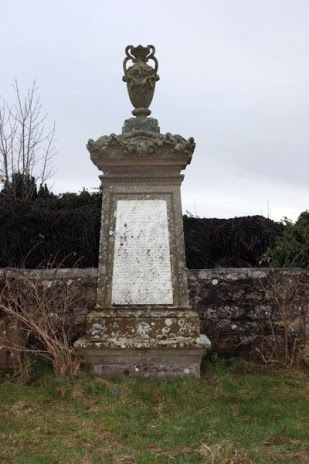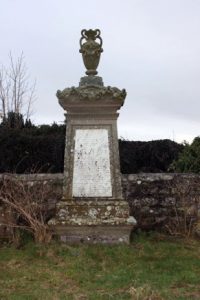Reverend Adam Thomson
Transcription
The Rev ADAM THOMSON who was born in Coldstream in 1776 and ordained in March 1806 where after a faithful ministry of 65 years he died in 1861
Commentary
‘An able Preacher, a faithful Pastor; to whose untiring efforts was largely due to the abolition of the Bible Printing Monopoly’
A plaque on the west wall of the Coldstream Parish Church displays this inscription. The words are considered to be a very fitting epitaph to one of the most distinguished natives of Coldstream. He was born, educated, worked for almost all his life and died in Coldstream. Yet some feel his achievements were not properly recognised. His father was a merchant in Coldstream and a session clerk of the Church. His mother, Esther Johnston, came from a long line of Berwickshire farmers. Their marriage produced a family of ten children, consisting of four boys and six girls. Adam was educated at the local school, and by the age of five could read English and, by the age of seven, he had mastered Latin. At the age of sixteen he went to Edinburgh University but for some reason he was unable to fulfill a degree. While holidaying at home in Coldstream, he and some other students decided to set up a ‘Sabbath School’ which, although it was held on a Tuesday, was identical to a Sunday Sabbath School. There was significant alarm raised by the authorities that this was contra to tradition and the group was branded ‘conspirators’.
At any rate, the Sheriff at Duns ordered the disbandment of the weekday Sabbath School and it was only started again in 1806 after Adam had been ordained as Minister. In 1799, Adam entered the Secession Divinity Hall in Selkirk and in 1804 he became licensed to preach. At this stage in their careers, ministers not of the established church were without churches and had to cover long distances to preach. A horse was vital and, even then, it wasn’t easy as the horses were often underfed and of poor quality. Adam deliberately avoided preaching in Coldstream until he had some experience elsewhere, preaching throughout the Borders and North Northumberland. He became much sought after and also preached in London and many other places. Although receiving several calls from other churches, Coldstream was the only one he wanted. When eventually Coldstream became vacant, the call was a unanimous one from his native town. He was finally ordained on 12 March 1806. Thomson would preach at five or six services a week, some of the places he visited being Leitholm, Birgham, Wark, Cornhill and Etal. The only means of transport was on horseback or in a pony and gig and, on one Monday, he rode more than twenty five miles, preached twice, visited several families and baptised two children. He wrote all his sermons out in full and then committed them to memory, so they appeared to be spontaneous.
In visiting villages, Thomson examined members of the church every month as he thought it helped to give him an idea of their progress in following his pulpit lessons. These results apparently were not always successful. In his diary he recounts that one afternoon he examined ‘AM’ with a view to being a Communicant, but he was under ‘the painful necessity of rejecting him’. When he asked AM, ‘What did Christ do to save us?’ AM’s reply had been, ‘He offered up his son Isaac’. Somewhat aghast, Thomson gave him the Sacramental Catechism to study and then dismissed him with deep sympathy and many serious exhortations! In August 1808, Thomson married Miss Isabella Turnbull from Moneylaws. Her father was a farmer, but had died leaving a widow. Two of their sons became doctors, one practicing in Coldstream (M.D. Turnbull) for some fifty years and creating the Turnbull Bequest for the benefit of Coldstream Soup kitchen. Thomson was an important community figure but on one occasion made it clear that he did not share the locals’ enthusiasm for the building of a racecourse at Coldstream. His biggest challenge lay ahead when, at the age of sixty, he took on the cause of the Bible Monopoly. The printing of Bibles in Scotland belonged to a monopoly of two people, Sir David Hunter Blair and Mrs B. Bruce, who obtained a comfortable profit of no less than £6,000 each year. Bibles printed in England were prohibited in Scotland, and both English and Scottish Bibles were said to be occasionally inaccurate. An example of this inaccuracy was that in the Seventh Commandment the word ‘not’ was left in so the text read ‘Know ye not that the righteous shall not inherit the earth’? One edition of the Oxford Nonpareil Bible had as many as 12,000 errors in it.
Thomson was increasingly incensed about this, and he proclaimed ‘All monopolies are bad, but of all monopolies a religious monopoly is the worst and a monopoly of the Word of God is the most ‘outrageous’’. The copyright was due to be renewed in Scotland several years before that in England and because of this, Thomson found that he had the support of some English people in his fight to break the Scottish copyright. If the copyright north of the Border could be broken, it would be likely that England would follow. In 1837 the stranglehold was broken through the decision of a Parliamentary Committee in London and there were to be no sole rights to print Bibles. Thomson visited London once more on the subject of bibles and held discussions with the Prime Minister, Lord Melbourne, and a Bible Board was set up with representatives from the Established Church. One immediate result was that the price of bibles fell by 20%-40%. Thomson advocated cheaper bibles in Scotland but met resistance from the bible trade – printers, binders and sellers – as they thought his perception of prices was unrealistic. The printing of Bibles started in Coldstream under the name of ‘Coldstream Free Bible Press’ and in 1845 some 178,200 bibles were printed, although none were allowed to be sent to England. The Bible Society positively opposed Thomson’s cheap bibles, but he was convinced that they could be sold reasonably, without making a loss. This was later to cost him dearly.
The monopoly in England was held by Spottiswoode & Company and the Oxford & Cambridge Universities. There was nothing to stop these bodies from selling bibles in Scotland and they reduced their prices accordingly. The Oxford Press could well afford this ploy, so if Coldstream reduced its prices, the English monopolists would sell a similar Bible for an even lower price and so on. Coldstream, with its much smaller capital, could not survive such tactics and was now selling below the cost of production. Thomson remarked that even if they were cheap, they were still too dear! Thomson’s binding had been carried out elsewhere but he brought this role to Coldstream in an attempt to force the prices down again. At first there was support from a ‘wealthy gentlemen (unnamed)’ in the North of England. With him, Thomson and his son, there was a small number of partners in control of the printing and a Manager was appointed. However, the ‘gentleman’ changed his mind, donated £1,000 and disappeared. The result was that Thomson and his son were left with heavy financial and business commitments. He himself thought that he was too old, so three members of his family became involved. His son in law added £5,000 to the capital and the others took shares, but a dividend was never paid and their money was lost. Thomson and his wife had to take in boarders to supplement his stipend. He gave his own house in Coldstream to accommodate the Bible binding, as well as the adjoining premises for the Free Bible Press.
During one month, 32,000 bibles had been sent to London for exporting and others went to Edinburgh, Glasgow and Dublin. But eventually, the underselling by the English monopolists resulted in Bibles to the value of £10,000 being left in the hands of the Free Bible Press. It is said that they were ‘put down the Tweed’. The Bible Society itself lost £14,000 in the six months of its undercutting exercise and then, not unexpectedly, stopped. The reason why the British and Foreign Bible Society failed to support Thomson has never been explained. The Coldstream Free Bible Press lasted twelve years before failing and losing all the shareholders’ money. Thomson was then aged seventy three and sympathy was expressed from all quarters with efforts being made to raise money to help his financial state, as he and his family members were living in poverty. A useful industry for Coldstream was lost, as it had at one time employed three hundred people. The different editions of the Coldstream Bible can be seen at the Coldstream Museum and the Parish Church. Thomson was advised to resign his charge and devote his energies to the Bible cause but he declined and suggested that the Church find him an assistant who could eventually become his successor. The Reverend Peter Mearns was chosen and they worked well together. Thomson was a genuinely remarkable man. There is a story of him, at the age of seventy, being in Kelso and there was no transport home. So he apparently walked home to Coldstream and remarked that he did not feel tired at all.
In March 1855, he celebrated his jubilee as a pastor and his 50th year of ministry. A special dinner in his honour was held for him at the home of Robert Tait of Lees Mill, who was one of Thomson’s elders. It was recollected at this dinner that since his ordainment in 1806, admissions to the congregation had averaged fifty a year, so that by 1854, one thousand and eleven people had been admitted to the Church. Thomson died in 1861, in his 82nd year, and was buried at Lennel just outside the north wall of the old Church. There is a long inscription, now only partly legible, on a tall and neglected monument half covered with lichen. At the lower part of the stone originally there was a carving of an open Bible but which now, sadly, has been knocked off or removed. A large wall clock which had hung for many years in the Parish Church Hall was recently taken down to be repaired and cleaned. On the pendulum was found the following inscription:
‘Dr Thomson, Coldstream AD 1840’
On the rear was written:
‘The gift of Alexr Purves, London. To Dr Thomson AD 1840’
The Bible Factory was located just off the Market Place but was demolished on 18 August 1983. At the time this event was depicted in a lovely sketch by the late (2009) local artist, Jim Page. Today a street name plate off the Market Place marked ‘Bookie Lane’ commemorates where this was. On reading the 1862 map of Coldstream it can be seen that bible prices had been dropped dramatically. Here they are:-
Non Pareil Bible Before 4s-6d After 0s-10d
Brevier Testament Before 1s-6d After 0s-6d
Pocket Bible Before 5s-2d After 0s-10d


